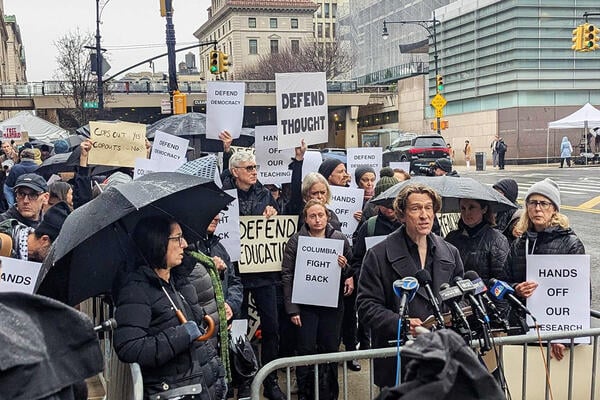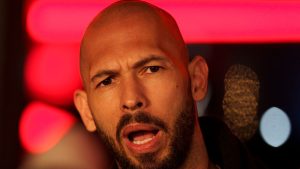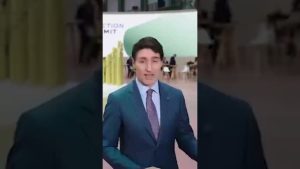NEW YORK CITY—Days after Columbia University decided to comply with the Trump administration’s sweeping and unprecedented demands, more than 100 people rallied outside the gates of the Ivy League institution in Manhattan, vowing to fight against what they see as authoritarian interference into higher education.
“Targeting Columbia is intended to strike fear into the hearts of university students, teachers and researchers everywhere, but we are unafraid,” said Mia McIver, executive director of the national American Association of University Professors.
The AAUP, a sharp critic of Columbia’s decision to comply, organized Monday’s rally, which was billed as an “emergency vigil.” Demonstrators, dressed in black, stood in the rain, holding signs that read, “Defend Thought,” “Columbia, Fight Back,” and “Cops out-Yes! Copouts-No!” Columbia professors who spoke criticized what they saw as their university’s capitulation and warned that the Trump administration’s decision to cut $400 million in federal grants and contracts will have broader consequences for the country. (Education Secretary Linda McMahon said over the weekend that the university is on the “right track” but didn’t say when or if the funds would be restored.)
Melanie Wall, professor of biostatistics at the Columbia, said the recently terminated grants funded research into psychotic disorders, new therapies to treat cancer, new home health-care systems for stroke outcomes, the effects of environmental pollution on health, and intimate partner violence, among other things. She added that she’s a collaborator on eight different grants from the National Institutes of Health that were cut.
“Stopping these 150-plus studies, midstudy, is a huge waste of resources,” she said. “It is research that affects all of us and our future … This attack is an exquisitely effective tool for trying to take down higher education as part of a larger conservative agenda hell-bent on destroying universities as we know them.”
Tim Frye, a professor in the political science department at Columbia, urged those gathered Monday to build alliances with alumni and business leaders as well as faculty, employees and administrators at other universities in order to fight back.
“For too long, we have been silent in the face of mischaracterization of who we are and what we do,” he said. “We have allowed our critics to define us by not publicly countering their misleading narratives. We must do so now at every turn.”
Many experts have said that the attack on Columbia will have implications for higher education more broadly and could set a precedent for federal intervention or investigations. Officials with the federal antisemitism task force, which ultimately cut off the funds, said Monday that Columbia’s compliance with the demands was only the first step.
Officials added in a news release that the task force’s actions “should serve as a roadmap for universities with similar problems across the country.” The task force is currently investigating nine other colleges.
“Other universities that are being investigated by the task force should expect the same level of scrutiny and swiftness of action if they don’t act to protect their students and stop antisemitic behavior on campus,” said Josh Gruenbaum, a political appointee at the General Services Administration and task force member.
Frye, one of the rally’s speakers, said that Columbia is a “great but imperfect institution” that hasn’t always lived up to its ideals while seeking to balance free speech and individual security.
“We have to admit that,” he said. “We must find ways to ensure that every student on campus feels safe and secure, but also free to express their political points of view, and that’s really hard, but that’s the job.”
The Columbia chapter of the AAUP had called on university administrators to reject the Trump administration’s demands, which included overhauling the disciplinary processes, banning masks at protests and placing a department in “academic receivership.” Columbia ended up agreeing to nearly all the demands, though it opted to appoint a new senior vice provost to oversee academic programs focused on the Middle East.
Michael Thaddeus, a professor of mathematics at Columbia and vice president of the Columbia AAUP chapter, said that the changes announced Friday “open the door to political influence over who we teach, what we teach, how we teach and even who is teaching.”
He added that if the Columbia administration “is going to desert us,” then students, alumni, elected officials, and the public will have to stand up and defend the university and academic and institutional autonomy. But he noted that many of his colleagues are “terrified [to speak out] and rightly so.”
To Thaddeus, the attack on Columbia is similar to the president’s criticisms and attacks on federal judges who rule against the Trump administration’s policies.
“There’s a reason why authoritarian regimes strike first at the judiciary and at universities,” he said. “These institutions—staid as they may seem—are the lifeblood of civil society.”








